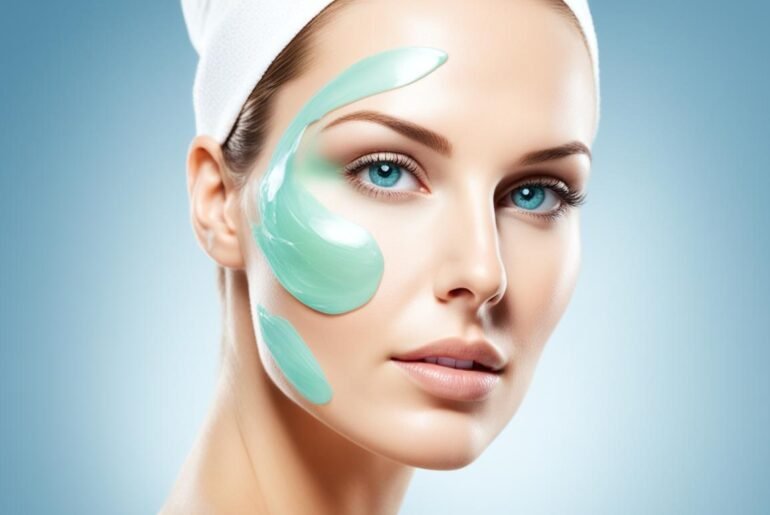
Did you know that your skin is the largest organ in your body, covering an average area of about 20 square feet? This vital organ not only protects you from the outside world but also plays a crucial role in your overall appearance. If you’re looking to improve your complexion and achieve healthy, glowing skin, incorporating omega-3 fatty acids into your diet may be the secret ingredient you’ve been missing.
Omega-3s offer a range of benefits for the skin, from regulating oil production and improving hydration to reducing breakouts and minimizing signs of aging. These essential nutrients also have a soothing effect on rough, dry skin and can even help improve conditions like irritation and dermatitis. But that’s not all—research suggests that omega-3s may also boost the skin’s immunity to UV damage and skin cancer.
Key Takeaways:
- Omega-3 fatty acids can have a significant impact on your skin complexion.
- Omega-3s regulate oil production, improve hydration, and reduce breakouts.
- These essential nutrients soothe rough, dry skin and help improve conditions like irritation and dermatitis.
- Omega-3s also have potential benefits in boosting the skin’s immunity to UV damage and skin cancer.
- Incorporating omega-3-rich foods or supplements into your diet can help achieve a healthy and glowing complexion.
What are Omega-3 Fatty Acids?
Omega-3 fatty acids are essential nutrients that play a crucial role in maintaining healthy skin. These fatty acids are found in certain foods and offer a range of benefits to our skin. They regulate oil production, improve hydration levels, reduce breakouts, and minimize signs of aging. Omega-3s also have a soothing effect on rough and dry skin, helping to improve conditions like irritation and dermatitis.
The ability of omega-3 fatty acids to regulate oil production is particularly beneficial for individuals with oily or acne-prone skin. By maintaining the right balance of sebum, the skin can remain moisturized without becoming overly oily and prone to breakouts. In addition, omega-3s improve hydration, leading to plump and supple skin.
Omega-3 fatty acids also possess anti-inflammatory properties, reducing redness and inflammation associated with skin conditions like acne and rosacea. They can help soothe rough and irritated skin, promoting a smoother and more even complexion.
“Omega-3 fatty acids play a crucial role in maintaining healthy skin by regulating oil production, improving hydration, and reducing breakouts.”
Furthermore, omega-3s have been shown to minimize signs of aging by supporting collagen production and reducing the breakdown of collagen and elastin fibers. This helps to improve skin elasticity and firmness, reducing the appearance of fine lines and wrinkles.
To summarize, omega-3 fatty acids are essential nutrients that benefit the skin in various ways. They regulate oil production, improve hydration levels, reduce breakouts, minimize signs of aging, and soothe rough skin. By including omega-3-rich foods in your diet or taking omega-3 supplements, you can support overall skin health and achieve a glowing and youthful complexion.
Foods that Contain Omega-3s

Omega-3 fatty acids are essential nutrients that offer a range of health benefits. While fish oil is the most well-known source of omega-3s, there are also vegetarian options for those who prefer plant-based sources. Incorporating these foods into your diet can help ensure an adequate intake of omega-3 fatty acids.
Fish oil: Fish oil is rich in omega-3 fatty acids, including eicosapentaenoic acid (EPA) and docosahexaenoic acid (DHA). Fatty fish such as salmon, mackerel, and sardines are excellent sources of fish oil.
Flax seeds: Flax seeds are a plant-based source of omega-3s. They contain alpha-linolenic acid (ALA), which is a type of omega-3 fatty acid. You can sprinkle flax seeds on cereals, salads, or yogurt for a nutritious boost.
Chia seeds: Chia seeds are another plant-based source of omega-3s. They are packed with fiber, protein, and healthy fats, making them a great addition to smoothies, oatmeal, or baked goods.
Soybean oil: Soybean oil is derived from soybeans and is a good source of omega-3 fatty acids. It can be used for cooking or as a dressing for salads and other dishes.
Variety of vegetarian sources: Apart from flax seeds and chia seeds, other vegetarian sources of omega-3s include walnuts, hemp seeds, and algae-based supplements.
Comparative Table: Omega-3 Content in Different Food Sources
| Food Source | Omega-3 Content |
|---|---|
| Fish Oil (salmon) | 1,430 mg per tablespoon |
| Flax Seeds (ground) | 2,350 mg per tablespoon |
| Chia Seeds | 4,915 mg per ounce |
| Soybean Oil | 950 mg per tablespoon |
| Walnuts | 2,570 mg per ounce |
| Hemp Seeds | 2,660 mg per tablespoon |
It’s important to note that while fish oil is known for its high omega-3 content, plant-based sources such as flax seeds, chia seeds, and soybean oil can still contribute to your daily intake. However, the body may need to convert the omega-3s from plant sources before it can fully utilize them. If you follow a vegetarian or vegan diet, incorporating a variety of these vegetarian sources can help ensure you’re getting the omega-3 fatty acids your body needs.
How Omega-3s Interact with the Skin
Omega-3s play a crucial role in improving the health and appearance of your skin. They have a direct interaction with the skin by improving the fatty acid composition and balancing its inflammatory response. These interactions result in several benefits for your skin.
- Better Fatty Acid Composition: Omega-3s help improve the fatty acid composition of the skin, making it more supple and moisturized.
- Balance Inflammatory Response: Omega-3s have anti-inflammatory properties that help reduce redness, inflammation, and irritation in the skin. This can be especially beneficial for individuals with sensitive skin conditions like eczema or rosacea.
- Minimize Sun Damage: Research suggests that omega-3s can minimize the damaging effects of sun exposure. They may help protect the skin from harmful UV rays and reduce the risk of sunburn.
- Improve Sensitive Skin Conditions: Omega-3s have soothing effects on sensitive skin, helping to alleviate symptoms of irritation and dermatitis. They can also improve the overall health of the skin barrier, making it more resilient to external aggressors.
By incorporating omega-3s into your skincare routine, whether through diet or supplements, you can improve the health and appearance of your skin. Omega-3s nourish the skin from within, giving you a natural glow and a healthier complexion.
Omega-3s have a direct interaction with the skin, improving the fatty acid composition and balancing its inflammatory response. This leads to softer, healthier, and less inflamed skin.
Recommended Omega-3 Intake for Skin Benefits

When it comes to reaping the skin benefits of omega-3 fatty acids, there is no one-size-fits-all recommendation. However, health experts suggest that adults consume about 500 mg of omega-3s per day or have two servings of fatty fish per week to support overall wellness and promote supple, radiant skin.
Omega-3 fatty acids are essential nutrients that play a crucial role in maintaining skin health. They help regulate oil production, improve hydration, and reduce breakouts, leading to a smoother and more youthful complexion. Additionally, omega-3s have been shown to minimize signs of aging and improve various skin conditions.
The recommended omega-3 intake of 500 mg per day or two servings of fatty fish per week can have a significant impact on your overall wellness, including the appearance of your skin. By incorporating omega-3-rich foods or supplements into your diet, you can enjoy the benefits of supple and radiant skin.
Importance of Omega-3s for Skin Health
Omega-3 fatty acids are known for their ability to nourish and protect the skin. They help maintain the integrity of the skin barrier, keeping it hydrated and preventing moisture loss. Omega-3s also possess anti-inflammatory properties, which helps calm and soothe skin conditions like irritation, redness, and dermatitis.
Furthermore, Omega-3s have been shown to support the skin’s natural defense mechanisms against UV damage. While they are not a replacement for sunscreen, consuming omega-3s can enhance the skin’s resilience to sunburns and reduce post-sun exposure redness.
By incorporating omega-3s into your daily routine, you can improve the overall wellness of your skin, leading to a more supple and radiant complexion. Alongside a balanced diet, omega-3 supplements can provide an added boost of these essential fatty acids to support your skin health journey.
Debunking Myths About Omega-3 Fatty Acids
There are several myths and misconceptions surrounding omega-3 fatty acids. Let’s address some of these common misconceptions to separate fact from fiction.
Myth: Any fish is a good source of omega-3s.
Reality: Different fish contain different levels of omega-3 fatty acids. While fatty fish like salmon, mackerel, and sardines are rich sources of omega-3s, other fish may have lower levels. It’s important to choose fish with higher omega-3 content to maximize the benefits.
Myth: All fish are high in mercury.
Reality: While it’s true that some fish contain higher levels of mercury, choosing smaller fish can help reduce the risk. Smaller fish, like anchovies or sardines, tend to have lower mercury levels compared to larger fish such as tuna or swordfish. This makes them a safer option for obtaining omega-3s without excessive mercury exposure.
Myth: Plant sources of omega-3s are just as beneficial as fish oil.
Reality: While plant sources like flaxseeds, chia seeds, and walnuts do contain omega-3 fatty acids, they primarily provide alpha-linolenic acid (ALA). The body needs to convert ALA into the more biologically active forms of omega-3s, eicosapentaenoic acid (EPA) and docosahexaenoic acid (DHA), to fully unlock their benefits. Fish oil, on the other hand, already contains EPA and DHA, making it a more direct and efficient source of these essential fatty acids.
To illustrate the differences between fish oil and plant sources, here’s a comparison:
| Fish Oil | Plant Sources |
|---|---|
| Rich in EPA and DHA | Provide primarily ALA, which needs conversion into EPA and DHA |
| Readily absorbed by the body | Conversion of ALA to EPA and DHA is less efficient |
| Unlock the full benefits of omega-3s | Require additional metabolic steps for optimal utilization |
While both fish oil and plant sources have their advantages, fish oil is a more direct and efficient source of EPA and DHA, the active forms of omega-3s.
Debunking these myths helps us understand the true value of omega-3 fatty acids and how to make informed choices when it comes to supplementation and dietary sources.
Omega-3s and Sun Protection

Omega-3 fatty acids offer more than just internal health benefits; they also play a role in protecting your skin from the damaging effects of the sun. Studies have shown that omega-3s can increase the skin’s resistance to sunburns, reduce redness after UV exposure, and even alleviate symptoms of photosensitivity disorders.
When we expose our skin to the sun, harmful ultraviolet (UV) rays can damage our skin cells and cause inflammation. Omega-3s work to counteract these effects by soothing the skin and promoting its natural resilience. By incorporating omega-3s into your diet or skincare routine, you can enhance your skin’s ability to withstand sunburns, a common result of prolonged sun exposure.
Additionally, omega-3s have been shown to reduce skin redness after UV exposure. This is particularly beneficial for individuals with sensitive or easily irritated skin. By adding omega-3s to your skincare regimen, you may notice a reduction in post-sun exposure redness and a more balanced skin tone.
Omega-3s may also have a positive impact on individuals who suffer from photosensitivity disorders, such as solar urticaria or polymorphous light eruption. These conditions cause an abnormal skin reaction to sunlight and can result in itchy rashes, hives, or blisters. While more research is needed to fully understand the link, omega-3s have shown promise in alleviating these symptoms and providing relief for those affected.
Incorporating omega-3s into your diet or supplement routine is a natural and effective way to support your skin’s sun protection abilities. By increasing your intake of omega-3s, you can enhance your skin’s resistance to sunburns, reduce redness after UV exposure, and potentially alleviate symptoms of photosensitivity disorders. However, it’s important to note that omega-3s should not be used as a standalone replacement for proper sun protection measures, such as wearing sunscreen and seeking shade during peak sunlight hours.
Omega-3s and Sun Protection
| Benefits of Omega-3s for Sun Protection | How Omega-3s Help |
|---|---|
| Increase the skin’s resistance to sunburns | Omega-3s enhance the skin’s natural defenses against UV rays. |
| Reduce skin redness after UV exposure | Omega-3s have anti-inflammatory properties that help soothe the skin and reduce redness. |
| Alleviate symptoms of photosensitivity disorders | Omega-3s may provide relief for individuals with photosensitivity disorders by reducing skin reactions to sunlight. |
Other Potential Benefits of Omega-3s for Skin and Hair

Omega-3 fatty acids have shown promising potential for benefiting not only the skin but also hair health. While more research is needed to confirm these effects, initial studies indicate that omega-3s may contribute to wound healing, skin cancer prevention, and hair growth.
| Potential Benefits | Description |
|---|---|
| Wound Healing | Omega-3s have been found to accelerate the healing process of wounds by reducing inflammation and promoting tissue repair. These fatty acids play a vital role in the skin’s inflammatory response, aiding in the formation of new blood vessels and healthy skin cells. Including omega-3-rich foods in your diet or using supplements may support faster wound healing. |
| Skin Cancer Prevention | Research suggests that omega-3s exhibit potential in protecting the skin against skin cancer, including both melanoma and non-melanoma types. These fatty acids may help suppress the growth of cancerous cells and reduce the risk of tumor formation. However, omega-3s should not substitute proper sun protection measures and regular skin screenings. |
| Hair Growth | Omega-3s may also play a role in promoting hair growth and preventing hair loss. These essential fatty acids contribute to a healthy scalp and hair follicles by nourishing the hair shaft and reducing inflammation. Including omega-3-rich foods in your diet or using supplements may support overall hair health and potentially stimulate hair growth. |
While these potential benefits are encouraging, it’s important to note that more research is needed to fully understand the mechanisms by which omega-3 fatty acids affect wound healing, skin cancer prevention, and hair growth. Additionally, the optimal dosage and mode of delivery, whether through diet or supplementation, require further investigation.
Conclusion
In conclusion, the benefits of omega-3s for skin health are vast. These essential fatty acids play a crucial role in regulating oil production, improving hydration, reducing breakouts, minimizing signs of aging, and improving various skin conditions. Incorporating omega-3-rich foods or supplements into your diet can greatly contribute to maintaining a balanced and healthy complexion.
However, it’s important to note that while the benefits of omega-3s for skin are well-established, further research is still needed to fully understand the extent of these benefits and determine the optimal intake of omega-3s for specific skin concerns. It’s always advisable to consult with a healthcare professional or dermatologist to ensure that you are incorporating omega-3s into your routine in a way that is most beneficial for your skin health.
To summarize, omega-3s offer a natural and holistic approach to achieving and maintaining healthy skin. By including omega-3-rich foods like fatty fish, flax seeds, and chia seeds in your diet, or by considering omega-3 supplements, you can enhance your skincare routine and improve the overall appearance and condition of your skin. Make omega-3 intake a priority, and experience the transformative power it has on your skin’s health and radiance.
FAQ
What are the benefits of using Omega-3 for a healthy skin complexion?
Omega-3 fatty acids regulate oil production, improve hydration, reduce breakouts, and minimize signs of aging. They also have a soothing effect on rough, dry skin and can help improve skin conditions like irritation and dermatitis.
Where can Omega-3 fatty acids be found?
Omega-3s can be found in foods such as fish oil, flax seeds, chia seeds, soybean oil, and other vegetarian sources. Fish oil is the most well-known source and is more easily absorbed by the body compared to plant sources.
How do Omega-3s interact with the skin?
Omega-3s improve the skin’s fatty acid composition and balance its inflammatory response. This leads to softer and less inflamed skin. Increasing omega-3 levels through supplementation also helps minimize the effects of sun damage and improves conditions like sensitive skin.
What is the recommended intake of Omega-3s for skin benefits?
While there is no set recommendation, health experts suggest consuming around 500 mg of omega-3s per day or the equivalent of two servings of fatty fish per week for overall wellness, including supple and radiant skin.
Are there any myths about Omega-3 fatty acids?
Yes, one common misconception is that all fish are good sources of omega-3s, but different fish contain varying levels of these nutrients. It’s important to choose smaller fish to reduce the risk of high mercury levels. Additionally, plant sources of omega-3s lack some of the components found in fish oil that unlock the full benefits.
Can Omega-3s protect the skin from the sun?
Omega-3s have been found to increase the skin’s resistance to sunburns and reduce skin redness after UV exposure. There is also evidence suggesting that they may alleviate symptoms of certain photosensitivity disorders.
Are there other benefits of Omega-3s for the skin and hair?
Some studies suggest that Omega-3s can accelerate wound healing, reduce the risk of skin cancer, and promote hair growth. However, more research is needed to confirm these effects and determine the optimal dosage.
What can you conclude about using Omega-3s for a healthy skin complexion?
Using Omega-3s has numerous benefits for the skin, including regulating oil production, improving hydration, reducing breakouts, and minimizing signs of aging. Consuming Omega-3-rich foods or supplements plays a crucial role in maintaining a balanced and healthy complexion. Further research is still needed to fully understand the extent of the benefits and the optimal intake of Omega-3s for specific skin concerns.



